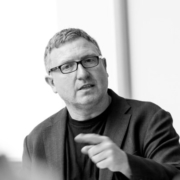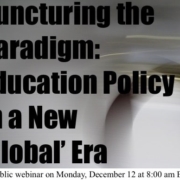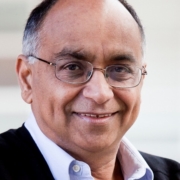Fazal Rizvi
Globalization and Educational Futures
Today Fazal Rizvi joins me to talk about his forthcoming book entitled Globalization and Educational Futures. Fazal revisits the rise of the popular discourses of globalization, examines many its discontents, and suggests nonetheless that it is too hasty to imagine its total demise.
Fazal Rizvi is Emeritus Professor in Global Studies of Education at the University of Melbourne, and Emeritus Professor at the University of Illinois at Urbana-Champaign.
Citation: Rizvi, Fazal with Will Brehm, FreshEd, 378, podcast audio, December 2, 2024. https://freshedpodcast.com/378-rizvi/
Will Brehm 0:00
Fazal Rizvi, welcome to FreshEd.
Fazal Rizvi 0:43
Thank you very much.
Will Brehm 0:44
Fazal, you have been writing about globalization and education. That’s kind of what you’re known for, and you’ve been writing about it for more than three decades. I mean, that is a long time, a lot has changed over that time, and I want to sort of focus today on how we might think about globalization and education in today’s world, but maybe to start it would be really good to just sort of understand how you even got interested in this topic 30 years ago.
Fazal Rizvi 1:13
Well, in 1989 there were major changes taking place in the world. Not only the fall of the Berlin wall, but lots of other things, including commercialization of the internet. Okay, so, if you look at the list of things that happened in ’89, it was really quite significant. So, I was already thinking about those changes that were taking place, and trying to make sense of them. During that year, towards the end of the year, I attended a lecture by Anthony Giddens -the sociologist from Cambridge- who presented a paper in which he did not mention the idea of globalization, but did talk about time, space, compression and the conditions of modernity, which later became a book of his in 1991. And that’s actually where my interest can be traced back to. You know, I became really interested, but then I started viewing my own personal journey from India to Australia and my diasporic connections through the prism of globalization. So, globalization became not only of theoretical interest, but also of personal interest.
Will Brehm 2:22
1989 seems so long ago, and things have radically changed since then, and we are talking in the aftermath of a second Trump presidency. In a couple months, he will become the president of the United States once again, and he’s already been talking about things like tariffs and stopping immigration and, you know, really sort of putting this sort of ethno-nationalist, sort of America first priority. And you know, as I was preparing for this interview, I actually listened back to a keynote address that you gave in 2016 and in that keynote, you basically focused on Trump when he first was elected, because it was just in the aftermath, and also Brexit, which was recently passed, but not yet sort of adopted -it took a couple years. And you argued at the time that Trump and the Brexiteers sort of embraced this leftist critique of globalization while sort of bolting on, and you use this word, ethno-nationalism. So, I guess eight years later, you know, with Trump’s second victory, how would you assess this current situation, given how you were thinking about it from 2016?
Fazal Rizvi 3:41
I think going back to 2016, it was really quite interesting, because there was a critique of globalization inherent in his language. Ethno-nationalism was really forefront, the tariff agenda was also there, and indeed, as was the agenda of not being involved, and critiques of multilateralism and multinational institutions were also there. Remember, one of his first acts was to withdraw from Paris Accord, you know? And that was really quite interesting and disturbed a lot of people who are committed to environmental sustainability. But as I started looking at his language, it had all these ethno-nationalist elements. But at the same time, the elements of global capitalist economy were left untouched okay. The structure remained the same. So, in other words, he was still about trade, although with tariffs. He was still about immigration, although with restrictions. So, in other words, neoliberalism did not die with him. Or a neoliberal version of globalization didn’t die with him. And one of the things that I’ve always been interested in is how the right has used the language of the left and re-articulated it. The word re-articulation comes from my reading of Raymond Williams, okay, and Stuart Hall. Basically, it’s using the same word but making it mean something substantially different, quite often the opposite. So, for example, Raymond Williams was committed to community, Raymond Williams was committed to devolution, he was committed to democracy, he was committed to a whole range of ideas that the right captured it, but actually translated it in the language of the markets. You see what I mean? So, in other words, the words were the same. And I’ve thought a great deal about that. Why is it that they do not actually come up with their own vocabulary, but use the vocabulary of the left.
Will Brehm 5:58
Why not? How do you explain that?
Fazal Rizvi 5:59
I actually think that there is a reason for that, you know. And this is simply this; that the terms that are already known in the professions, in the civil society, you know, and people are committed to those. They want to not abandon those terms as seeming to be radically different but continuous with the kind of values that teaches, for example. So, the idea of devolution was already there in the 1980s and even before that in the 70s. But in the 1990s neoliberal discourses of globalization absolutely turned it upon its head, and it became decentralization. It became, rather than thinking about it in democratic language, it became, if you like, public management language, you know? So, the term was kept, but with very different meaning, and I think that is essential in order to make sure that people are brought into that discourse or discursive community, without actually feeling that they’re being radically re-altered in terms of their values and commitments.
Will Brehm 7:12
And this notion of devolution turning into decentralization, also turning into sort of like deregulation, creating the unfettered market to operate as it pleases, outside of the state control.
Fazal Rizvi 7:28
But you know that public management, new public management, in particular, was informed by many of the precepts of neoliberalism and market logic, you know? So, as a result, they were together, you know. And what happened was deregulation suddenly became an obvious answer to the attempts to provide devolution, decentralization, etc., etc. So, I’m really interested in the ways in which the words are used in relation to each other and made into meaning something radically different.
Will Brehm 8:07
What terms do you see that are potentially being rearticulated, being co-opted from the left and being rearticulated for sort of a more conservative agenda?
Fazal Rizvi 8:19
Well, localization is one of those terms. You know, basically, one of the things that Trump is very keen on is abandoning the Department of Education. He’s not going to do it by saying that education is not important. He’s going to say education best belongs to local communities and parents. Okay? And this is the kind of thing that a number of governors in United States have done, including Virginia and Florida and various others places, which basically have highlighted the power of the parent and power of the communities to do their own thing. So, my own view is what he is likely to do -if he does abolish the Department of Education, he will do it in the language of federalism, American federalism, and in the language of efficiency. Okay, efficiency will become the meta value against which he will redefine various other words. And that’s why I think the Ramaswamy and Musk agenda is really viable. They have deliberately chosen the term “Department of Government Efficiency”, okay. So, in other words, they have actually brought the term efficiency to the center of public policy discourse in order to re articulate the meanings of lots of terms in terms of market efficiency.
Will Brehm 9:49
You can also see something similar with abortion rights and this notion of Trump saying, I’m not against abortion rights. I’m against the federal government having a law of abortion, and we want to put it back to the States. We’re a federal, you know, society, and we’ll let the states decide what to do.
Fazal Rizvi 9:49
In many ways, many of the Trumpian theorists, if you like, are members of the Federalist Society, and they interpret federalism slightly differently to the meaning of federalism in Australia or in Germany or in other places. They really believe in decentralization of a certain kind in which individuals have -I mean, they come very close to libertarianism, you know. And as a result, the notion of federalism is, how can we actually look at the sensibilities of libertarianism and translate those into the language of federalism?
Will Brehm 10:13
So, in 2022 you put out a book -it was an edited volume, and it was entitled, “Reimagining Globalization and Education”. And I guess the question is, why did globalization and education need to be re imagined at that time?
Fazal Rizvi 11:13
Well, it was very interesting. Bob Lingard and I had written a book called “Globalizing Educational Policy” in 2010, and in 2020 it occurred to both of us that many of the arguments in that book may have actually become exhausted, may have run out their “use by” date. So, as a result, we felt that a new addition was needed. At the same time, very happily, you know, and gratefully, the book was very well received around the place, and has been translated in three or four languages, you know. And we kept on getting pressure from the publisher to do another version. And we sort of said, no, no, we can’t do that, you know. I mean, we just don’t have time. And we had both just retired, you know? And so, the idea was to actually get something like 10 to 12 of our very close friends to comment on the relevance of the arguments from the 2010 book in 2020. So, as a result, we invited people against our own understanding of what had changed. So, what had changed? Well, to start off, with rise of ethnonationalism and populism, you know, around the world, not only in the United States. The deep awareness of environmental issues and environmental crisis -that had become an issue. Deep concerns about the fall of belief in institutions generally, but multinational in particular. Deeper awareness that economy was changing from the kind of manufacturing economy to the service economy at a much more rapid rate than we had even realized, and that is likely to change even more with the gig economy and various other iterations. So, there was another. We had believed that the idea of meritocracy had become deeply problematic. We had decided that organization of higher education had become somewhat problematic in the new age. So, basically, we’d identified all these topics that we felt represented the changes that had taken place over the decade from 2010 to 2020, and then we identified our friends who could write on those topics. So, that was the way in which we structured the book. Unfortunately, I don’t think it worked out as well as we had hoped.
Will Brehm 14:03
Why not?
Fazal Rizvi 14:04
Well, the reason why it didn’t work out is something to do with the nature of academic work. You know, when people are asked to write an article, you know, they don’t always take seriously the narrative that you provide them, you know, and they write whatever it is that they’d been working on. And because we had given them the license, sort of saying, we want you to think about our arguments in relation to your area of expertise now. So, they wrote about their expertise, but did not engage with the arguments of the 2010 book to the same extent that we had hoped.
Will Brehm 14:41
Right? I guess, coherence can be hard when you have large groups of people working on something.
Fazal Rizvi 14:46
Absolutely. And some of the people that we chose are very, very busy people, you know. And as a result, it became really very difficult to actually push them to revise and revise and revise their chapters, you know. I mean, one revision was as much as we could have hoped for. So, as a result, I mean, our noble aspirations were not realized, although it turned out to be quite a good book.
Will Brehm 15:10
I have looked through it, and I must say, some of the articles are really good; they stand up on their own. But I can understand the larger critique you’re making of how they all fit together into this larger critique of your earlier work, and it didn’t necessarily. So, what would you have liked them to articulate? Like, what critique can you make about your own work?
Fazal Rizvi 15:33
For example, we would have liked to sort of say the changing nature of work and labor relations and employment. We wanted that to be highlighted, to sort of say that the ways in which we interpret the global economy had to be rethought and reimagined, you know? So, in other words, we said nothing about environmental crisis in 2010 and we said it just needed to be said. You know, we said nothing about youth cultures; we assumed that that needed to be changed quite dramatically as well. We said nothing about the rise of Asia, okay, especially China, and the difficult relationship between China and the West. So, we actually asked Michael Peters to write an article because he was working at Beijing Normal University at that time, and we thought that he would write about it in a very thought -and he did, actually, except, you know, not in relation to the arguments of our book, but in relation to whatever it is that he wanted to say at that time. I’m not I’m not being critical. I’m saying it’s a function of the nature of academic work.
Will Brehm 16:45
That’s right. And again, each of the chapters stand up on their own. And they are good pieces, I guess. All of those sorts of silences that you have articulated when you think of them collectively today, what do they tell us about globalization and education?
Fazal Rizvi 17:05
Well, let me go back to how I have always thought about globalization. I don’t like the abstraction globalization. I have two ways of interpreting globalization, empirically or normatively? Okay, empirically, it is basically conditions that we can refer to as the facts of global interconnectivity and interdependence. Normatively, we can say that it is a way of thinking about possibilities of globalization in relation to that interconnectivity and interdependence. Can you see the relationship between them? That’s how I’ve thought about it. My own view is that globalism as a neoliberal articulation has now become exhausted. So, as a result, the ways in which people interpreted globalization in the 1990s within the framework of neoliberalism, what I call neoliberal imaginary, okay, has become incredibly difficult. What has not disappeared are the facts of interconnectivity, okay? And indeed, facts of interdependence. And I think that’s where populism will run into problems, okay? Because as much nationalism and ethno-nationalism as you push, you know, interconnectivity is here to stay.
Will Brehm 18:37
Yeah. And I mean, on that populism and interconnectivity, you know, it is fascinating to see someone like Steve Bannon make these connections across the globe, and sort of connecting right-wing populist movements across the globe together as a form of globalization.
Fazal Rizvi 18:54
And that conservative forum that is held every year, you know, that is becoming globalized. So, as a result, you know, connectivity across -the other aspect of connectivity is technology. You know, technology is not going to go away. It’s going to make it easier for us to talk to each other and make friends and make links and all those sorts of things, especially with the rising number of diasporic populations in a country like United States. I mean, in United States, we’ve got something of the order of 1.5 million people of Indian background, you know, and they are quite highly placed, and they are absolutely committed to making sure that their diasporic links are as productive for them personally and for the two nations that they belong to, that’s not going to disappear. So. as a result, I’m sort of saying that that abstraction, in so far as is linked to global interconnectivity of globalization shouldn’t be abandoned. Okay, so globalization is here to stay, but in another form.
Will Brehm 20:00
Right. And you’re also not saying that because this neoliberal imaginary might be shifting or coming to an end, or whatever it is, globalization definitely staying there. But you’re also not saying that capitalism is going anywhere. It’s sort of capitalism itself might be shifting as well, but it’s sort of interconnected with this notion of globalization.
Fazal Rizvi 20:21
Radically. I mean, you have a look at somebody like Elon Musk. You know, he’s promoting an ethnonationalist language, but his behavior and his actions are completely global, you know, in relation to the ways in which he organizes his business, in relation to the way he thinks about Bitcoin now, in relation to the ways in which he thinks about links and his own preparedness to interfere in other countries’ local politics, you know? So, as a result, he’s an incredibly global citizen but at the same time, you know, he is also encouraging a form of what Yanis Varoufakis calls techno-feudalism, you know? And I think globalization is being attempted to be remade by techno-bros.
Will Brehm 21:24
Yeah. And bringing up, you know, Yanis’ book on techno-feudalism, because he sort of is arguing that we’re entering this period that is not capitalism as we know it, and so we sort of are living in this moment of, there is still capitalism, but there’s also these sort of cloud capital, as he calls it, where we as consumers, or digital serfs, as he says, enter these digital platforms, and we give over our data, we might pay money to be there, and we get sort of trapped in these digital platforms, and the value extraction is not from surplus labor like it is in capitalism, but rather from the digital trails that we make on these platforms that can then be monetized and control our sort of needs, wants, and desires. A
Fazal Rizvi 22:19
And also, it actually relates to the nature of employment, and what kind of jobs we are going to have. And that relates to education, of course, you know, because there are going to be very, very few people who are going to be the owners of cloud capitalism, if you like. The rest of the people are either going to be serfs, okay, service sector, or in between, you know, basically small businesspeople, you know, with very precarious lives, as the guy standing points out, you know. So, as a result, we are going to have three layers; there’s the capital ownership class, there are the serfs, you know, basically in the service sector, and then there are people who are trying to lead very precarious lives and have huge aspirations but very little possibility of getting into the capital owning class.
Will Brehm 23:13
So, are these some of the topics that you are working through in this new book that you’re currently writing -you’re currently calling it Globalization and Education Futures.
Fazal Rizvi 23:25
This is a book that is part of a series that Bob and I edit called Key Ideas in Education, and the construction of the book is very interesting. Basically, what we invite for this series is very, very mature age, senior scholars who are approaching their retirement or have gone past their retirement. And the idea of the book series is to get them to say something about how they became interested in a theorist or in an idea, how has their thinking changed, although, and what is likely to be the future? So, as a result, it is a book that introduces the theorist as well as the theorizer, talking about how their ideas are connected. So, for example, we have a book by Zeus Leonardo, on Edward Said and Education and the book is simply about how he became interested in it, how his reading of Edward Said, has changed, and how it is relevant going to the future. There are other books by Deborah Britzman on Freud and Education. There is another book by Carl Grant on Du Bois and Education, and Antonio Darder on Freire and Education, and so on and so on. But all of them, and there are new books coming out, one on Rabindranath Tagore and Education by Ratna Ghosh from McGill. So, that’s the general idea of the book, but there are also concepts that we’re looking at. So, James Gee did a book on literacy and education, and how he became interested in literacy education issues, and then how his thinking has changed with the emergence of technology and all those sorts of things, you know? So, I am writing that book in the same tradition, for the same series, looking at how my thinking about globalization, okay, originated and has changed, and what it is I think the educational futures are likely to look like.
Will Brehm 25:38
How would you begin to really help us understand globalization and education and its futures, because it’s a plural, right? It’s multiple futures. You know, how are you seeing it currently?
Fazal Rizvi 25:50
Well, to begin with, I think there’s going to be a major, major, tense debate, conflict, even over future. Already we are seeing that future is being interpreted and being organized and being steered in different ways. So, there is the right-wing future of this Nirvana that they are promising, which is unlikely to be realized because of the conditions of global interconnectivity. You know, that kind of globalization is being proposed, but is not likely to be realized. There’s the technocratic globalization that countries in Bangalore and Singapore and Beijing and Shanghai are promoting, you know, anticipatory governance and things like this. There’s also the conception of democratic governance that is also floating around the place. And then, of course, there is the idea of techno-governance, you know, which is linked to all of those three, but in different ways. So, what I’m trying to do in the final chapter in this particular book is trying to sort of say how these competing ideas of future are based on differing assumptions, differing ideas, but they’re also interacting with each other in a whole range of complicated ways.
Will Brehm 27:07
How, then, does education fit into this sort of multifaceted landscape that you’re painting?
Fazal Rizvi 27:14
Educational institutions around the place have become -a term that I’ve used a number of times now- exhausted. And I use that term quite deliberately, you know, because it’s not that we don’t think education is important, but I think the modalities of educational governance and educational thinking, they are becoming exhausted from the past, and institutions are becoming exhausted too. I mean, you look at University of Melbourne, University of Canberra, University of Illinois, they all appear exhausted institutions. And as a result, they’re trying to figure out what it is that’s going to be the future. And my own view is that the future is going to lead to a diversity of types of education, but how that state is going to manage those alternatives is totally unclear, and exactly what the state would want to do is also unclear, because already we are seeing indications that the state doesn’t want to get involved in education to any great extent, but the market can’t do it either.
Will Brehm 28:30
No. And it raises a fascinating question of; what does the public mean in this sense, when there’s all these different alternatives that you can potentially choose to go to?
Fazal Rizvi 28:41
And that’s where the localization agenda becomes really complicated. Localization agenda could become so inbred and so exclusive of each other that a coherent public space is almost impossible to realize, you know? So, I mean, I don’t know whether you know the work of Michael Sandel. He has been talking about this quite a bit, you know. And basically, I mean, I have to say that in many ways, he believes that some form of Jewish pragmatism is what is required. And I’ve been thinking about that, you know. And I’m sure there are a lot of philosophers in education, philosophers of education in United States in particular, would say it’s about bloody time. You know what I mean? But I’m not at all clear how that kind of pragmatism that he’s presenting, which is linking to a democratic theory, might emerge. In other words, he’s thinking about creation of a public space. But if you’re going to have diversification and localization and a form of liberal libertarianism, you know, then how do you bring all those diverse elements together? And who does it?
Will Brehm 29:59
That’s right, you know, I think what the public means sort of it has to be re articulated.
Fazal Rizvi 30:06
Well, I think so, but it’s very difficult to articulate because -I mean, my own view is that that requires some mode of diasporic and ethical thinking, you know? Thinking how scattered people can nevertheless get together. Scattered, not only geographically scattered, but also politically scattered people, you know? How do they come together and develop some common good? And that’s very, very difficult to even imagine at this stage, you know, given that we are going through a stage where problems are becoming more and more evident, but solutions are becoming very elusive. Well.
Will Brehm 30:50
Well, Fazal Rizvi, thank you so much for joining FreshEd. Really a pleasure to talk and really nice to do this in person.
Fazal Rizvi 30:56
Okay, thank you very much.
Want to help translate this show? Please contact info@freshedpodcast.com
Related Guest Publications/Projects
Reimagining globalization in education
Global mobility, transnationalism and the challenges for education
Global interconnectivity and its ethical challenges in education
Globalizing educational policy
Globalization and postnational possibilities in education for the future
Theorizing student mobility in an era of globalisation
Rethinking “brain drain” in the era of globalization
Globalization and policy research in education
Equality and the politics of globalization in education
Mentioned
Conversations with Anthony Giddens – Making sense of modernity
The rhetoric of Donald Trump
“I am a tariff man”: The power of populist foreign policy rhetoric under President Trump
Stuart Hall: Selected Writings
Virginia’s educational options
Elon Musk and Vivek Ramaswamy’s DOGE government efficiency pitch
The global networking of the far-right and the left response
Techno-feudalism: What killed capitalism – Yanis Varoufakis
Routledge key ideas in education
Edward Said & Education – Zeus Leonardo
Freud and Education – Deborah Britzman
Du Bois and Education – Carl Grant
Freire and education – Antonio Darder
Tagore and education – Ratna Ghosh et al
Literacy and education – James Paul Gee
Democratic governance: A genealogy
Recommended
The global networking of the far right and the left’s response
Far-right contagion: The global challenge of transnational extremist networks
Development without freedom: The politics of Asian globalization
The globalization backlash
Globalization, cleavages, and the radical right
Globalization: What’s new? What’s not? (And so what?
DHL global connectedness tracker and report
Globalization isn’t in decline: It’s changing
The future of capitalism in a post-neoliberal world
Have any useful resources related to this show? Please send them to info@freshedpodcast.com









